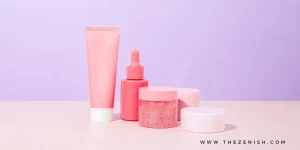It’s a popular method for removing oils, makeup, and impurities from the skin. But does oil cleansing dry out your skin?
The short answer is yes, it can.
But really it mostly depends on your skin and how it reacts to the oils you’re using.

Aren’t oils supposed to be hydrating and moisturizing? Why does my face feel dry after oil cleansing?
When most people start oil cleansing the last thing that comes to mind is dry skin.
In fact, most people avoid using any type of oil on their face because they’re worried about being too oily and breaking out.
So it seems a little counterintuitive that oil cleansing could cause dryness, but it can.
But how is that possible? It’s oil cleansing! It should hydrate your skin not dry it out!
Well, it could be the type of oil you’re using or your process. Here are a few common reasons for dryness and a few suggestions:
Reason # 1
You’re not using the right oil for your skin
The type and quality of the oils you use matter. Not all oils are created equal and no, not everyone can use cooking oil from their kitchen.
Yes, it can work out well for some but is a terrible idea for others.
Olive oil for example can cause havoc to your skin by causing transepidermal water loss and can damage your skin’s protective barrier.
You would benefit more from eating good quality olive oil than applying it to your skin.
Some oils like castor, grapeseed and hemp seed oil promote water loss in dry skin and others like squalane, safflower and rosehip don’t.
Depending on the quality of the oils you’re using they will either lock moisture in; hydrate your skin or lock moisture out; causing dehydration and dryness.
The type of oil you use also determines how your skin reacts.
Oils like coconut and jojoba seed oil are great for moisturizing while grapeseed, hemp seed, and avocado oils are best for dry skin because they’re non-comedogenic, which means they won’t clog pores and cause breakouts.
Reason #2
Your face cloth is irritating your skin
If you’re using a face cloth to wipe off any excess oil after using your oil cleanser, make sure the cloth isn’t too rough because it will only end up irritating your skin.
Instead, use one that’s soft enough that it won’t irritate your skin but will still clean your face. These ultra soft absorbent bamboo facecloths are made of rayon made from bamboo and won’t rub your skin raw.
You can also experiment using microfibre washcloths as well like these ultra-soft reusable microfiber makeup removing towels. Both facecloths are available on Amazon, just click the links to check the price.
You can also switch to an oil cleanser that’s formulated with a mild surfactant so it will cleanser rinse off with water and there’s no need for a face cloth.
Reason #3
The water is too hot
Don’t rinse your face with hot water.
This is a common mistake most people make when washing their face. And once corrected can make a major difference, especially if you already have dry or dehydrated skin.
If you’re using heat or steam to help loosen the buildup on the surface of your skin, then taking a few more minutes to massage the oil into your skin will do the same thing.
Oils work well to loosen up any buildup on the skin and give a deep cleanse.
Hot water, on the other hand, can be super drying and can even damage your skin barrier, so avoid using it on your face at all costs.
Using cold or lukewarm water is just as effective.
Suggestion #1
Ditch the water
Did you know you can oil cleanse without rinsing?
You can, there’s even a name for it; the dry oil cleansing method. And it works really well for dry and dehydrated skin.
It works the same as the regular oil cleansing method you just don’t rinse the oil off at the end so there’s no need for water.
With this method, you use a damp face cloth at the end to wipe away any buildup from your skin.
Assuming you’re using the right/compatible oils for your skin this method can be very effective at cleansing, is super moisturizing and shouldn’t clog your pores or cause acne.
However, if you’re prone to breakouts or have active acne I wouldn’t try this.
Suggestion #2
Try a different type of cleanser
Oil cleansing isn’t a one-size-fits-all solution to skin care. And if you find that oil cleansing leaves your skin feeling dry, it might be time to try something else.
Fortunately, there are a lot of other options you can try.
You can try cream cleansers, cleansing milk, and cleansing balms, which are often made with oils and butter that help to seal in moisture and are good for treating dry skin and protecting your skin from a dry environment.
If you’re acne prone and want to try a cream, milk cleanser or balm just be aware that they sometimes have certain occlusive ingredients in them like shea butter, cacao butter, beeswax, lanolin, and petrolatum that can sometimes clog pores and cause acne.
FAQs
Why do some oils make your skin feel dry?
Not all oils are moisturizing.
Oils are made up of different ratios of fatty acids, nutrients, antioxidants etc and will work differently depending on your skin type.
Some oils are naturally more drying than others.
This means that some oils are better for oily skin, and others are better for dry skin.
Some oils will leave your skin feeling dry because they have more lipids and fewer water-soluble molecules.
These lipids form a barrier on the surface of the skin and prevent water from penetrating into it.
This means that they then form an oily film on top of your skin preventing moisture from getting in so they don’t actually add any hydration where it counts.
Should you moisturize after oil cleansing?
If you have dry skin or your skin feels dry after then yes, use some moisturizer.
A lot of people use moisturizer after oil cleansing to lock in moisture and make their skin feel extra soft.
So if you’re prone to dry skin or want to combat extra dryness, you may want to moisturize after oil cleansing at night and again in the morning.
The key to keeping your skin soft and moisturized after oil cleansing is using a hydrating serum or cream. Your skin will thank you and stay soft, hydrated, and supple!
Should you stop oil cleansing?
No, you shouldn’t stop oil cleansing because it makes your skin feel dry. Most likely that means the oil you’re using doesn’t work for your skin.
If you’re not suffering from an allergic reaction, dermatitis, worsening acne or breakouts, I would advise you not to stop.
I say this because there are plenty of other oils you can use to make up for the ones that leave your skin feeling dry.
So you can either try a different oil or try mixing two different oils together. You could even start by adding a few drops of coconut or jojoba oil to the oils you already use to try to make them more hydrating.
Moisture and hydration are super important when you have chronic dry skin so for even more hydration use a moisturizer after so your skin didn’t feel right or dry after rinsing the oils from your face.



